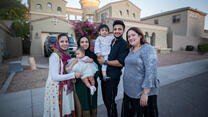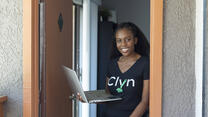
For almost a decade, Tony and Emmy award-winning actor Mandy Patinkin ("Evita," “Homeland,” "The Princess Bride") and his wife, actress and writer Kathryn Grody, have been working as International Rescue Committee (IRC) Ambassadors to bring global attention to the challenges refugees face around the world.
“The greatest gift of being connected to refugees is how they teach me to live, how they affect my soul, because they have come from such unimaginable conflict, unimaginable situations of pain and suffering, and they go on,” Patinkin said. “They take care of their children, they build homes, and they never give up. They are teachers of our lives.”
Patinkin and Grody recently sat down with two IRC staff members in Elizabeth, NJ, to learn more about their experiences and how the IRC helps refugees resettle in the U.S. They spoke with Diana Mbogoni, who arrived in the U.S. from Kenya 21 years ago and is now a resettlement program manager. They also spoke with Shir Zad Sarbaz, an Afghan refugee who just arrived in the U.S. in December 2021. Shortly after he arrived, Shir Zad volunteered to help the IRC translate for other Afghan refugees. He recently became a full-time caseworker.
The interviews have been edited and condensed.
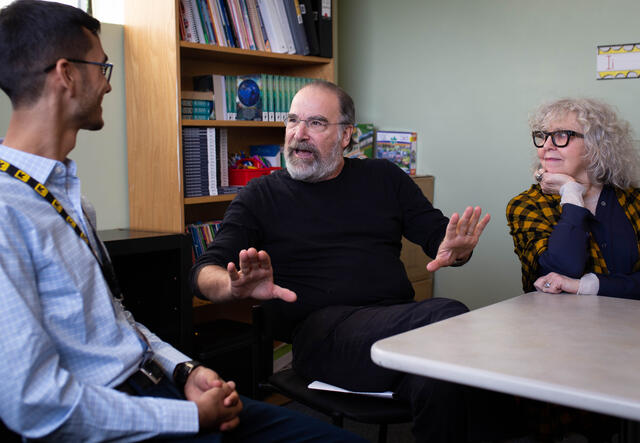
Mandy Patinkin: Diana, what does that mean to be a resettlement program manager? What does your job entail?
Diana Mbogoni: I oversee three programs under the resettlement program: reception and placement for refugees who just arrived; the matching grant program, which is an early employment program from the federal government; and a federal program for case management to help people with intensive medical needs navigate the medical system.
From October 2021 to mid-April, we served a total of 354 people out of our New Jersey office, most of them Afghans evacuated during Operation Allies Welcome.
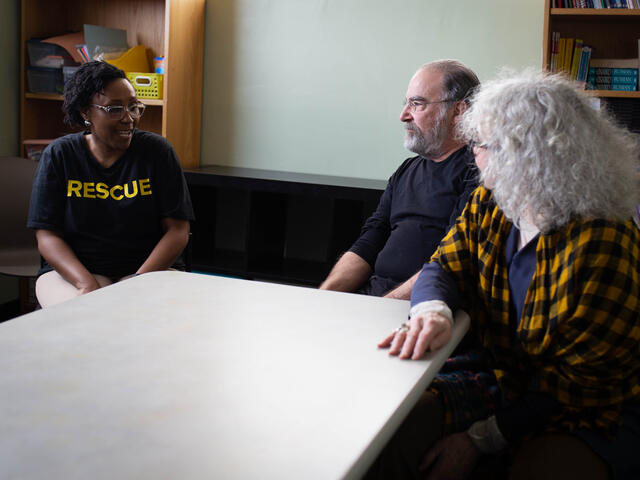
MP: What do you find to be the greatest challenge to your work?
DM: Currently, the greatest challenge is housing due to the housing crisis, pandemic, and laws and regulations for acquiring a new home. It's quite challenging for new arrivals who do not even have a credit score because they are new in the country.
The IRC has housing specialists that help refugees find apartments when they don’t have family in the U.S. to stay with, and we provide temporary housing until they find a permanent place.
Shir Zad Sarbaz: Everything is dependent on something else. For instance, we get families in different sizes, we try to get a house near to a school if they have a child, and we try to find housing near the kind of work people are willing to do, whether that is in an office or a factory.
Finally, our housing specialists promise the landlord that we will support the family, by making sure they understand the lease, helping with any misunderstandings and in some cases offering financial assistance.
DM: We welcome more landlords to open their doors to the refugees. They come here running away from conflict. They are here to start a new life, build the American economy, and be citizens in the U.S. (Editor’s Note: If you are a landlord, you can find more information about renting to refugees here.)
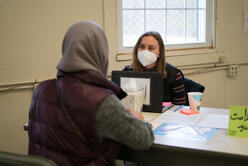
Kathryn Grody: Shir Zad, what do you find to be the biggest challenge in your work?
SS: For me, the first challenging point that I find is the cultural differences, because we get families from different countries. So it takes time for the family to understand the reality of life here. That’s a bit challenging. To help, the IRC provides cultural orientation classes as a core part of resettlement, which provide an overview of U.S. laws and other expectations and systems that may be new to families.
MP: How did you come to work for the IRC?
SS: I was in temporary housing, at a hotel, and the IRC was trying to find an apartment for me. In that hotel, there were so many other Afghan families that the IRC needed to communicate with. I speak the national languages of Afghanistan, Dari and Pashto. So I volunteered. Eventually, I was hired as a caseworker.
MP: What was it like getting your first apartment in the US?
SS: To me, a home is not just walls or just shelter. It's a feeling. When you get to your new apartment, you feel that you are not alone. In those apartments that the IRC provides, there are so many people who voluntarily help to bring furniture, to prepare the homes for the refugees. So when I got into my own apartment for the first time, I felt that there are so many good people still around the world that really want to help refugees. I was really thankful.
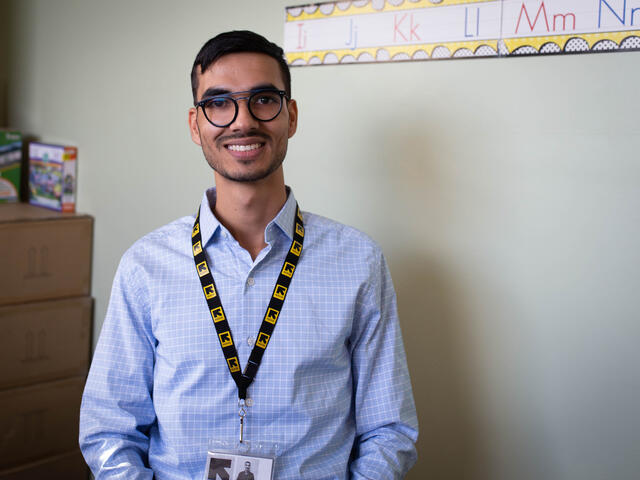
MP: How do you go about helping refugees find jobs that are appropriate for their skills and education?
SS: Our employment team will assess each and every family. They will talk to them, interview them, and ask them, “What did you do? What are your degrees? In which field did you work?” And they will try to match them with available jobs. If we don't have a specific job that matches their background, we offer them something else they can do to start to earn money. Eventually, the person will find their own position in the US.
MP: How do you help refugees with the language so they can communicate on their own?
SS: We have an education department that is in charge of providing them with internet, a laptop, and online English classes according to their English level. We have classes for everyone. Even if they speak English, we still provide them with an advanced-level English class.
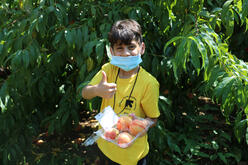
KG: Does the IRC work with schools to help welcome refugee students?
SS: When we find that a family has children to be enrolled in school, our education department will take care of everything — all the documentation and required vaccines. We will go to their home and take them to the clinic to get the vaccines. Even on the first day of school, the IRC staff will go with the children to the school and introduce them to their classmates.
MP: What is something you’ll never forget from your experiences working with the IRC?
DM: I was working with a refugee who was a pharmacist and wanted to get straight into his profession. However, it can take a while for foreign professionals to transfer their credentials to the U.S. and get certification under U.S. regulations. I was able to convince him to take a job at Walgreens because they have certification courses for pharmacy assistants. Within two months, he called me, very excited, telling me, “I listened to you. They are now taking me to the certification course. I will be a pharmacy assistant!” That is one of my favorite stories.
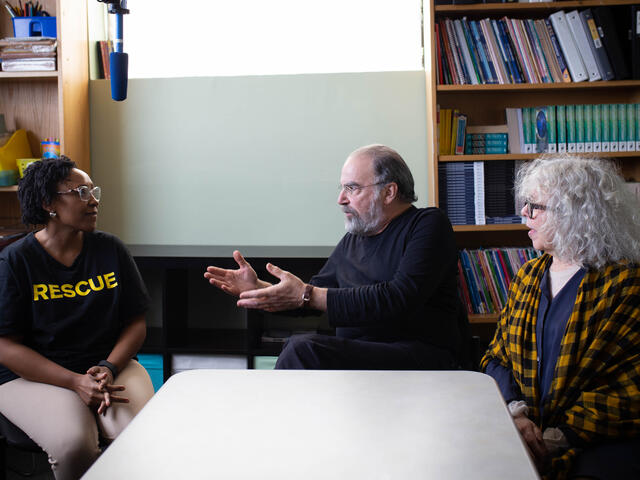
KG: What would you say to people who are nervous about refugees from another country coming here?
SS: Everything starts with good communication. I personally recommend that they talk to [refugees], listen to them and hear what they have gone through. If you tell your problem to someone, half of the problem is solved. It’s a good way just to understand a new family.
KG: What were some of the specific cultural differences you experienced when you came to the U.S.?
SS: In my country, if you shift to a new house, all your neighbors will provide you hot meals for three days. They will bring furniture, they will bring anything that the family needs just to start their life.
KG: Even if you’re strangers?
SS: Yes, even if you’re strangers. They will offer them cash, they will try to find them jobs. Obviously, the IRC will do that for any refugee, but in the U.S. people do not do that.
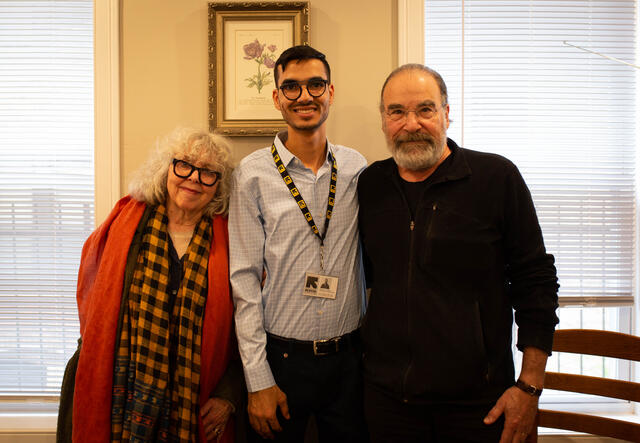
MP: In Judaism, we have a phrase, “Tikkun olam,” which means “repair the world.” If you want to repair our world, one of the best things you can do as an American citizen is to donate to the IRC. Funding is needed now more than ever.
DM: We welcome all volunteers to come and support us. We've been able to work with local communities and local organizations to help and support refugees when they come into the country. There are a lot of ways to support the IRC — volunteering, donating, and also advocating for refugees to be admitted.
In the Bible, there is a saying that you should love your neighbor as you love yourself. We are all neighbors, regardless of where you are. And refugees are our neighbors. So we should always open the door with open arms. You never know when you are going to need your neighbor's help.
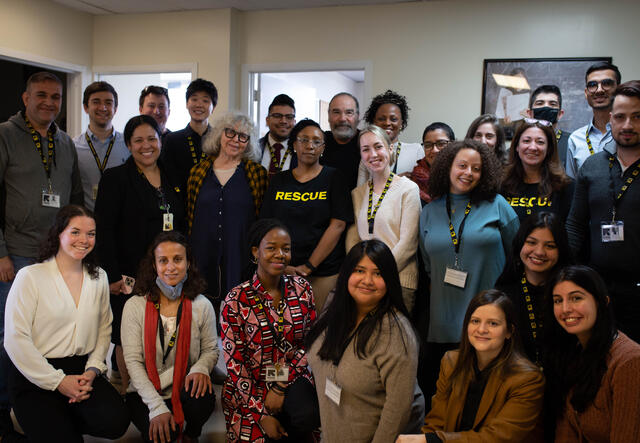
How to help
The IRC works in 25 cities across the country to welcome Afghans, Ukrainians and other refugees as they rebuild their lives in the U.S. Here’s how you can support:
Donate by signing up for a monthly gift that will be used where it is needed most.
Learn how you can support the IRC’s New Jersey office or an office near you.
Volunteer in a local office or remotely. Opportunities include preparing new homes for refugee families, mentoring someone as they restart their career and tutoring students.
Sponsor an Afghan family. Established organizations, such as businesses, university communities, faith groups, sports teams or local clubs can become Afghan Placement and Assistance (APA) Community Partners to help families get on their feet.
Rent to a refugee. If you are a landlord, find out how you can rent to a refugee.


